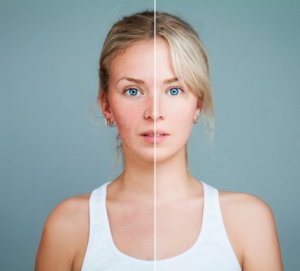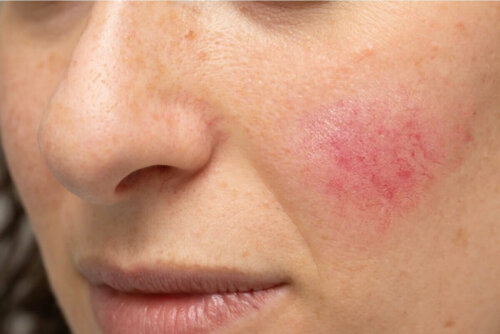Seven Foods You Should Include in Your Diet to Reduce Rosacea


Reviewed and approved by the physiotherapist Sofía Quintana Alonso
You don’t have to resort to makeup in order to reduce the appearance of rosacea. In addition, you can also treat it by improving your diet. In this article, we’ll explain which foods you should incorporate into your diet to do so.
Rosacea is a disease that affects your skin, especially your face. Rosacea causes inflammation in the blood vessels under your skin. This condition causes swelling, redness, and skin lesions similar to those produced by acne.
Doctors still don’t know what causes it. However, there are certain things that increase your chances of suffering from it. For example, having light skin, eyes, and hair, and being a woman over 30 years old are all risk factors. At least according to a study.
Rosacea causes inflammation of the blood vessels under the skin, and certain cases might be due to eye disorders. This is because many people have eye symptoms such as dryness, redness, and itching.
There’s no cure for rosacea

There’s still no cure for rosacea, so treatment focuses on its symptoms. Doctors prescribe medications in some cases although others require surgery.
In fact, Dr. Jonette E. Keri explains, “initial treatment of rosacea involves avoiding triggers (including the use of sunscreen). Antibiotics or azelaic acid may be used for inflammatory diseases. The goal of treatment is to control the symptoms, not cure of the disease.”
Rosacea appears in spurts that are usually triggered by elements like food. In fact, certain products have the ability to worsen these symptoms.
In this respect, it’s important to know which foods are worse for your skin.
What is the best diet to improve rosacea?
To improve rosacea, you need to follow a balanced and varied diet. However, there are endless options to choose from.
Various experts say that the nutritional component of different foods can cause outbreaks. Therefore, we recommend that you figure out which foods help improve rosacea and which make it worse.
In this article, we’ll show you some foods to add to your diet that can help improve and control rosacea. If they aren’t already in your diet, we recommend that you add them.
Foods to improve rosacea
Health authorities believe that proper nutrition can provide multiple benefits to the body. Thus, a balanced diet can apparently help maintain a good quality of life and control certain symptoms of this disease.
There’s no specific dietary pattern for rosacea; however, there are recommended eating plans, such as the Mediterranean diet and the Harvard plate, and you can use them as a guide.

What foods can’t be missing from your diet?
- Vegetables. Just like in any diet, you should always have vegetables. These give your body multiple vitamins and nutrients. Of course, you should avoid spinach, tomatoes, and avocados.
- Lean meats. Chicken and fish are very good for rosacea because they’re healthier and have a lower amount of fat. Therefore, they help you maintain low body heat. Heat is one of the triggers of rosacea.
- Omega 3. Foods rich in omega 3, such as fish, have an anti-inflammatory function that helps decrease swelling. You can eat nuts, salmon, mackerel, and wheat germ.
- Berries. Blueberries, cherries, and blackberries exert a vasoconstrictive action in the body. This helps bring down inflammation in blood vessels under your skin. Therefore, they reduce redness.
- Onions. Due to its protein, potassium, vitamin C and flavonoid content, it’s said that this food can contribute to skin health.
- Sources of vitamin A. This vitamin is essential to keep your skin healthy. Red peppers, carrots, papayas, and melons have lots of vitamin A.
Discover: Lose Weight Healthily With These Seven High-Protein Vegetables
Foods that aren’t suitable for rosacea

Now that you know what foods can help reduce rosacea, you must also know how to avoid those that worsen it.
- Coffee
- Chocolate
- Alcoholic beverages
- Tomato and orange juice
- Juices, flavored water, teas, and other processed drinks
- Very spicy foods like peppers, chilis, certain marinades, ginger, soy, mustard, as well as other spices or sauces
- Red meats that contain trans fat, like beef
- Foodstuffs high in fats, sugar, and refined flour, such as biscuits, cakes, pastries, sweets, and chips
When in doubt, talk to your doctor. Keep in mind that not all organisms are the same and that what may be good for one person may be bad for others.
All cited sources were thoroughly reviewed by our team to ensure their quality, reliability, currency, and validity. The bibliography of this article was considered reliable and of academic or scientific accuracy.
- Bhargava, R., Chandra, M., Bansal, U., Singh, D., Ranjan, S., & Sharma, S. (2016). A Randomized Controlled Trial of Omega 3 Fatty Acids in Rosacea Patients with Dry Eye Symptoms. Current Eye Research.
- Clinica Mayo. Rosácea. Diciembre 2021.
- Gil Díaz, M. J., Boixeda de Miguel, J. P., Truchuelo Díez, M., & Morais-Cardoso, P. (2011). Rosácea: revisión y nuevas alternativas terapéuticas. Semergen. https://doi.org/10.1016/j.semerg.2010.08.004.
- Katta R, Kramer M. J. Skin and diet: an update on the role of dietary changes as a treatment strategy for skin disease. Skin Therapy Letters. Enero 2018. 23 (1): 1-5.
- Keri J. Rosácea. Manual MSD. Febrero 2022. https://doi.org/10.3109/02713683.2015.1122810.
- Kober M. M, Bowe W. The effect of probiotics on immune regulation, acne and photoaging. International Journal of Women’s Dermatology. Abril 2015. 1 (2): 85-89.
- National Institutes of Health. Office of Dietary Supplement. Vitamin E. U. S. Department of Health and Human Services. Marzo 2021.
- Prassad A. Zinc: role in immunity, oxidative stress and chronic inflammation. Current Opinion in Clinical Nutrition and Metabolic Care. Noviembre 2009. 12 (6): 646-52.
- Ramírez, V. G., Hernández, A. T., Rojas, R. F., Inés, J., & Rueda, V. (2011). Rosácea: enfoque dermatológico y oftalmológico. Med UNAB.
- Troielli P, González Otero F. M, et al. Actualización y recomendaciones para el diagnóstico y tratamiento de la rosácea en Latinoamérica. Medicina Cutánea Ibero-Latino-Americana. 2016. 44 (S1): S7-S26.
- Weiss E, Katta R. Diet and rosácea: the role of dietary change in management of rosacea. Dermatology Practical and Conceptual. Octubre 2017. 7 (4): 31-37.
This text is provided for informational purposes only and does not replace consultation with a professional. If in doubt, consult your specialist.








